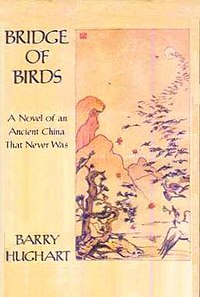A brilliant and tasteful aunt bought me Bridge of Birds when I was in my late teens or early 20’s, Shortly after when the book came out. She’d turned me on to Shel Silversteen, and this book had even greater impact.
According to the wikipeia
Hughart called the novel “a modern version of a classical form of Chinese novel, which was an underground Taoist form designed to fight back against Confucians. Confucians liked to castrate people who fought the establishment. Without mentioning names, the Taoists could use real emperors and real power structure in a fantasy form.”[2]

I liked that the subtitle is “a novel of an ancient China that never was” which called to mind Twain’s prologue to Huck Finn, in how it allows the writer to find a truth that can only be found through absolute (or alleged) fiction. The novel won an award for Fantasy, but it defies easy classification. It has the backbone of philosophy and high humor of a Douglas Adams book, and the real protagonist isn’t the sober character that has all the time and attention, but a drunken lunatic (Ford Prefect in The Hitchhiker’s Guide books, or Li Kao in Bridge). It’s essentially a mystery – for which I have a weakness.
But the humble narrator of Bridge, Number 10 Strong Ox, roped me in as an adolescent. His credulity, earnestness and earthy peasant values as well as his famed strength appealed to me. But reading it 20-or more years later, I dig Li Kao more. He is the ancient sage and #1 scholar who introduces himself with the comment, “I have a slight flaw to my character.” He once sold an Emperor a mustard mine, and his excesses in terms of alcohol and larceny stretch the imagination, but he’s a believable if more morally complex Robin Hood with supreme intellect as his chief weapon instead of a bow (he’s wicked deadly with a throwing knife though). People get killed, virtues are tested and redefined, and evil-doer’s get their come-uppence.
I loved the book the first time I read it, and some passages stayed with me over 20 years. There’s a romance to it, which makes sense now that I have learned about the Shepard and The Weaver in Heaven myth – the lover’s tale. I also now get the joke about how Li Kao got his name, from “the best paint thinner and worst wine in history, Kao Liang.” As someone who studied in depth the possible ways to consume the 150 proof + spirit made of Sorghum (milo), I say with authority that is a brilliant assessment. I never took it seriously as an ingress into Chinese culture, but I should have. It’s been translated into 6 languages, but not Chinese yet as far as I know. I keep finding or rereading that some of what I thought were throw away jokes or gags, have their basis legitimate history.
I’ve read the book 2 more times this summer, and while I loved the book as an adolescent, I didn’t realize it exposed me to so much Chinese culture and literature – through an uproariously funny and relate-able modern fable. The layers to the book are worth exploring. For example, Li Kao has a running theory that myths and children’s stories hold meaning to a peoples racial memory or spiritual infrastructure… I know how bad that sounds but it’s late and it’s a blog for chrissakes. As I’ve said before, Hughart does for classics of Chinese Literature what Disney did for Shakespeare in (Bridge is to the Weaver and the Cowheard what The Lion King is to Hamlet).
I like that he goes after Confucians (Li Kao or Hughart). I never met a woman raised in Asia who was a fan of Confucius; And I read the analects and tried to use that to access the culture when I first went to Taiwan in ’95. Imagine an Asian student coming up to your average American and trying to talk about John Dewey (if Dewey were sexist and hard-core authoritarian). That’s probably what I looked like.
This is another book I’d like others to read. Were my background, interests or sense of humor too idiosyncratic – or would would students take to it like I did?